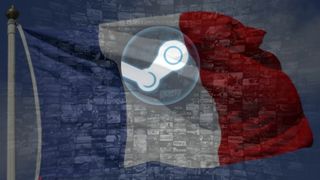What does this French resale ruling against Valve even mean?
Valve can no longer stop French users from reselling games, but there's more to this than that.

On Sept. 17, 2019, A French court passed judgment on a case involving the makers of the Steam Store, Valve. In UFC-Que Choisir vs Valve, the French court deemed the resale of digital materials on the Steam network to be lawful.
This ruling is huge and could have serious ramifications for all digital game stores. According to the site Next Impact, which broke the story first, the Tribunal de Grande Instance — Frances highest court — determined the following:
The owner of the right concerned can no longer object to the resale of this copy (or copy) even if the initial purchase is made by downloading. The publisher of the software (or its beneficiaries) can no longer oppose the resale of this copy or copy, notwithstanding the existence of contractual provisions prohibiting a subsequent assignment."
This is translated from the French site, so it might not be verbatim, but it essentially says that Valve can no longer stop its French users from reselling video games once they are downloaded.
But what does it mean?
There's a lot to unpack here. Since we haven't seen the repercussions of all of this yet, a lot of this is speculation.
Here's what we understand though. The Tribunal de Grande Instance (TGI) has made it clear that because Valve sells you the game for an unlimited time limit, it cannot be considered a subscription and therefore falls under the normal EU rules set in place for Copyright materials.
Finally, the" subscription "to the" subscription "(of a game) made by the user, which is mentioned in the conclusions of the company VALVE (...) is actually a purchase, the game being made available to said user for an unlimited period. It can not, therefore, be a "subscription" - in the usual sense of the term - but the sale of a copy of a video game, made for a price determined in advance and paid in one go by the user.
The TGI used European law, specifically the Copyright Directive 2001, the Software Directive of 2009, as well as other specific cases, to reach this conclusion. Since it invoked EU law to come to this conclusion, the outlook for Valve could be pretty bleak.
If this is upheld Valve will have to change its Terms of Service within 30 days since the court says the clause denying the right to resale is "deemed unwritten." This means the clause is unlawful and therefore cannot be enforced by Steam, at least in France. Right now, Valve has 30 days to remove the clause in its Terms of Service and to allow French users to sell their downloaded steam games, but that can change if the ruling is challenged.
Get the Windows Central Newsletter
All the latest news, reviews, and guides for Windows and Xbox diehards.
How does it affect you?
At the moment, unless you're a French Steam user, you won't have to do anything and your experience with the service won't change. However, because of the way the EU works, if the EU governing body decides the French ruling is just, it could force Steam to adopt the same procedures across the Union.
If the rest of the world falls in line with this French ruling it would fundamentally change the way digital game stores ... do business.
Would the U.S. follow suit? We don't know as different rules apply here. We know that the GDPR has affected all internet users, even though the ruling is localized to the EU. While this case differs quite a bit from the GDPR, if Steam wants to keep curtailing the resale of digital content it will have to make some big changes.
Of course, the U.S. has a different ethos from the EU. The FTC tends to favor big business in these cases rather than the user, so it could potentially ignore this ruling altogether. It's difficult to tell at this point.
If the rest of the world falls in line with this French ruling it would fundamentally change the way digital game stores such as Steam, GoG, and even the Epic Store do business. By selling us the product for an unlimited time these game stores open themselves up to this ruling. However, therein lies what could save the situation for those companies.
What can Valve do about it?
Speculatively, I would think Valve's best option would be to change how long we own the game for. If Valve changes the wording in its ToS to put a time limit on the purchase, 99 years for instance, then it could potentially claim Steam sells a "subscription" to a game, not the game itself.
This is shaky ground but could provide what it needs to keep control of the resale of products. The Steam Store could even give its users a mechanism to easily download and strip the DRM from a digital game, though this is not mentioned in the case. So far no one has told Steam it has to help resell games, only that it can't stop it.
Valve could also create a French specific version of Steam — Steam.fr for example — that could comply with the French ruling but would allow it to control the situation better globally. This would be time-consuming for Valve and potentially costly.
There's also an option that concerns an earlier decision. Back in 2014, German courts ruled against the user's right to resell digital games but in the last five years things have changed considerably. The fact that the German courts ruled differently than the French ones means the EU as a whole will have to deliberate more before coming to an agreement. Both countries have now set different precedents, so making the decision isn't going to be easy.
Could Valve appeal and use this German ruling to help its case? Perhaps, but France's decision would still stand. It will be up to the EU courts to decide if it should be upheld across the Union.
Final thoughts
Things are going to be strange for Valve over the next 30 days. It either has to come up with a way to either circumvent this ruling or start letting French users sell their used digital games. If the latter happens, the can is open and the worms are likely to get out.
One saving grace for Valve from this ruling is from earlier in the case. The UFC-Que Choisir has suggested that the person selling the used software would have to "render unusable the copy downloaded on his own computer at the time of resale." If Valve can build this into Steam, and perhaps create a pre-owned section to sell the games, Valve could actually profit twice from the sale.
It's going to be an interesting 30 days as we wait to see if Valve will comply with the French ruling and how it will handle this new blow to its business model.
James built his first PC when he was 13 and has never looked back. He can be found on Windows Central, usually in the corner where all the 3D printers are, or huddled around the Xbox playing the latest games.

